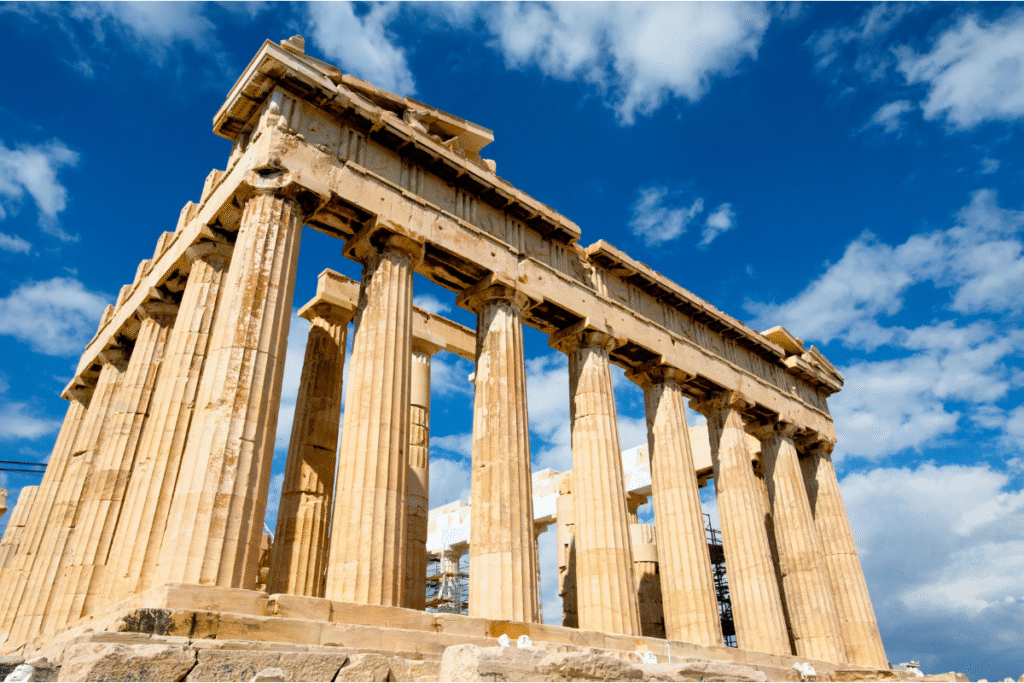
Greece’s ancient pillars still stand tall, but the economy needs new foundations. Credit: nonbirinonko from pixabay via Canva.com
Greece’s economy is growing, the tourists are pouring in, the crisis is decades behind, and Athens is suddenly full of rooftop bars and refurbished ports. However, besides the recovery, a question keeps surfacing. What is Greece actually producing? Here’s the thing, though: you cannot build a thriving domestic economy solely on frappes and flights.
Tourism is seasonal, shipping is global and volatile, and the country’s position in the global value chain is closer to serving global trade than designing circuit boards. Greece ranks low on economic complexity, a measure that indicates the sophistication and diversity of the country’s exports. Therefore, we need to understand why Greece needs to stop relying on what is easy to sell and start investing in what is hard to build. From green manufacturing and deep tech to real innovation ecosystems, because complexity in 2025 is a survival tactic.
Economic complexity
Economic complexity is not just jargon; it’s a measure of how a country contributes to the global table, not in terms of volume, but in terms of what it’s capable of producing and how few others can do relatively the same.
Greece, by contrast, is heavily relying on sectors that are vulnerable and have low margins, including.
- Tourism
- Raw materials
- Food exports
- Maritime services
They are relatively important, but their impact is limited in terms of stretching the value. According to the latest Harvard Growth Lab data, Greece sits well below the EU average and complexity rankings, and it’s not just behind France or Germany but also behind Portugal, Slovenia and Estonia.
This context matters because it not only raises GDP but also improves wages, while buffering economies during downturns and attracting long-term investment. Additionally, it helps build capacity, so the next crisis doesn’t wipe out sectors overnight. Without that foundation, the economy might appear stable for a while, until the wind takes it in a completely different direction.
How Greece compares to the rest of Europe
According to the Harvard Growth Lab’s 2023 Economic Complexity Index, Greece ranks 50th globally, placing it behind countries like Portugal (43rd), Slovenia (12th), and Poland (24th)—all of which have climbed into more specialised, higher-value industries over the past two decades.”
- Slovenia leveraged EU accession to scale advanced manufacturing.
- Estonia adopted a digital-first approach to governance and services.
- Ireland invited global tech firms, cut corporate tax to 12.5%, and built a legal framework that made it easy to base IP operations there.
- Ireland now ranks in the top 20 globally—a pivot from farmland to pharma.”
Greece has the potential for new high-value exports and possesses the necessary ingredients for it. The question is whether it will use them before the recovery boom fades away.
There are signs of change in Greece. The €31 billion Greece 2.0 recovery plan includes funding for both green and digital infrastructure, vocational training, and industrial zones. The issue isn’t a lack of funding, but rather a lack of cohesion. Without policies that reinforce one another, innovation becomes siloed, and infrastructure investment fails to spark genuine transformation. Complexity doesn’t thrive in fragmented systems; it needs a connected ecosystem.”
What’s holding Greece back
Bureaucracy remains one of the country’s most entrenched obstacles. The legal framework in Greece encompasses numerous grey areas, and enforcement varies significantly by region.
The shadow economy accounts for around 21.5% to 30% of Greek GDP, according to estimates from Eurobank and academic studies. This includes undeclared services, VAT avoidance, and under-the-table wages—weakening public finances and discouraging long-term business planning.”
It’s also challenging to find innovation when half the system remains off the books. The irony? Most of these problems are fixable, but they require follow-through, not just funding announcements. Complexity doesn’t emerge from one-off efforts; it comes from making it easier to be serious.
Tourism may sell Greece to the world, but complexity is what enables it to compete. The real export isn’t sun or scenery ,it’s capability. And that’s what turns recovery into resilience







